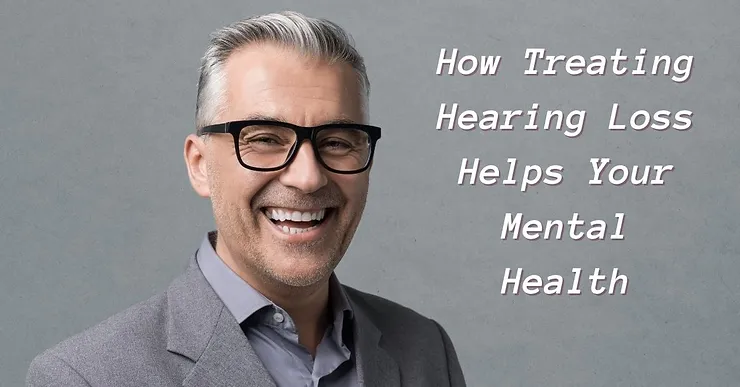
Hearing loss is a physical issue, but there is a close relationship between the body and the mind. Physical health is correlated with many facets of social and psychological health, and hearing is no different. One way to think about this connection is the connection between hearing loss and poor mental health. A key aspect of our mental function is listening, understanding, and connecting with the people around us.
You might be surprised by the wide variety of mental conditions associated with your ability to notice sounds around you, particularly the voices of colleagues, loved ones, associates, and casual meetings every day.
Although hearing loss can affect mental health, the good news is that treatment of hearing loss may positively affect mental health.
Research indicates a link between hearing loss and mental health.
A 2014 study found that hearing loss in individuals of all ages induces detrimental mental health effects, but those effects were more pronounced in people aged 18-69. Perhaps this is because social interaction is more expected among people in this age group and affects everything from job prospects to looking for a life partner.
A recent study in Italy also found that working adults aged 35–55 with mild to moderate hearing loss were more likely than those with normal hearing to have interpersonal problems.
More studies are likely to be forthcoming about the mental health issues that hearing loss can cause. Here are some of the ordinary condition associated with hearing loss:
-
Depression: More than 2,300 individuals with hearing loss were analyzed in a new survey by the National Council on Aging. It found that people with hearing loss were 50 percent more likely to experience depression. And it’s not just feeling down once in a while; many seniors with untreated hearing loss have reported feelings of two weeks or more of sadness and or depression.
-
Cognitive decline: Some studies have shown that the risk of cognitive disorders, including dementia, may be increased by hearing loss. It is unclear the cause behind this connection. However, one explanation is that hearing loss triggers a cognitive load in the brain, which diverts resources from other areas, potentially leaving those areas exposed to damage.
-
Social isolation: Many seniors, especially in noisy environments, become frustrated with their attempts to listen and understand. As a consequence, they avoid events, individuals, and locations they once loved. Many studies have shown that persons with untreated hearing loss are substantially less likely than those who use hearing aids to engage in social activities.
It’s not too late to get treatment.
Since hearing loss is associated with aging, many people who have age-related hearing loss might think that there is no point in treating their condition, as it feels inevitable.
Hearing aids, however, may reduce the burden of keeping up with a conversation and help keep you more involved socially. The mental effort required to listen and understand without hearing aids can be overwhelming. You will feel much less fatigue when using hearing aids, correctly fitted by a hearing professional.
The adverse effects of loneliness have been compared to smoking 15 cigarettes a day. As such, hearing aids will help us feel healthier, more independent, and more active socially.
Better than your grandfather’s hearing aids
Today’s hearing aids are like specialized mini computers, built to give you the ability to understand others again. You could be able to hear better with stylish, ergonomic designs that fit snugly behind your ear or even sit within your ear.
Modern hearing aids have a range of features, such as directional microphones, rechargeable batteries, wireless connectivity to your smartphone and TV, and mobile apps with remote control options. You’re never going to have to fiddle with your system, and you’re going to have absolute control.
Make an appointment for a hearing test today if you’re struggling with untreated hearing loss. There are many types of hearing aids available to fit whatever lifestyle you lead, so talk to our team today to learn more.
